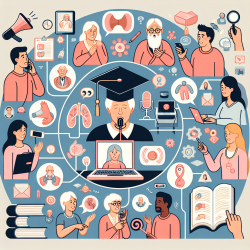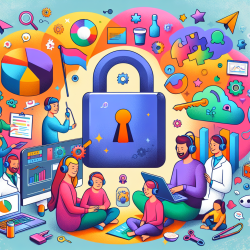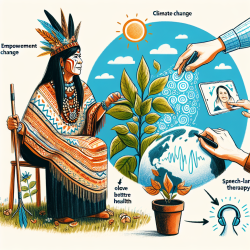As a practitioner in the field of Speech-Language Pathology (SLP), staying updated with the latest research and implementing evidence-based practices is essential for providing the best outcomes for your clients. One such groundbreaking study, "INTERGENERATIONAL BONDING: A PATHWAY TO CAREER READINESS IN SPEECH LANGUAGE PATHOLOGY GRADUATE STUDENTS," offers valuable insights into how intergenerational bonding can enhance career readiness for graduate students in SLP. This blog will explore the key findings of this research and provide actionable steps for practitioners to improve their skills and outcomes by integrating these findings into their practice.
Key Findings from the Research
The study conducted by Ghazi-Saidi and McKelvey (2023) at the University of Nebraska at Kearney introduces an innovative experiential learning activity for SLP graduate students. The program involves cognitive intervention provided to older adults via telepractice, fostering intergenerational interactions. Here are some of the critical outcomes of the study:
- Enhanced Competency: Students showed significant improvement in their perceived competency pre and post-intervention.
- Real-Life Interaction: The program provided students with real-life interactions that helped them apply academic knowledge more effectively.
- Increased Motivation: Students reported increased motivation to learn new skills and a greater sense of ownership over their learning process.
- Career Preparedness: Alumni and their supervisors noted better preparedness and performance during clinical internships.
Implementing the Findings in Your Practice
Based on the research outcomes, here are some strategies you can implement to enhance your skills and improve client outcomes:
1. Foster Intergenerational Bonding
Integrate activities that promote interactions between different generations. This could involve organizing community events where children and older adults can engage in joint activities, or setting up telepractice sessions that allow for intergenerational communication.
2. Utilize Telepractice for Cognitive Interventions
Leverage telepractice to provide cognitive interventions to older adults. This not only expands your reach but also provides valuable real-life interaction opportunities for students or new practitioners in your practice.
3. Measure Competency and Performance
Regularly assess the competency and performance of students or new practitioners in your practice. Use pre and post-intervention surveys to gauge their progress and identify areas for improvement.
4. Encourage Ownership of Learning
Create an environment that encourages practitioners to take ownership of their learning. This could involve setting personal goals, providing access to resources, and fostering a culture of continuous improvement.
Encouraging Further Research
While the study provides a robust framework for enhancing career readiness through intergenerational bonding, it also opens the door for further research. Practitioners are encouraged to:
- Conduct similar studies within their practice to validate the findings.
- Explore other forms of intergenerational interactions and their impact on career readiness.
- Share their findings with the broader SLP community to contribute to the collective knowledge base.
To read the original research paper, please follow this link: INTERGENERATIONAL BONDING: A PATHWAY TO CAREER READINESS IN SPEECH LANGUAGE PATHOLOGY GRADUATE STUDENTS.










